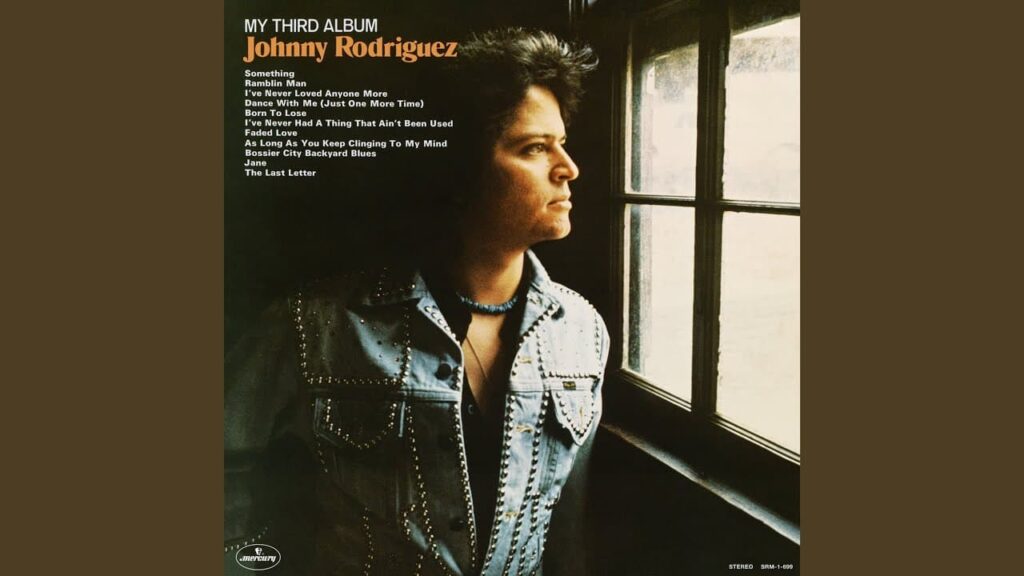
The Painful Return: A Bitter Acceptance of a Recurring Heartbreak from an Unavoidable Love
Johnny Rodriguez‘s deeply poignant and soul-stirring ballad, “You Always Come Back (To Hurting Me)”, is a raw and honest testament to his unique ability to convey profound heartbreak with a disarming blend of vulnerability and weary resignation. This emotionally resonant track was a significant hit for Rodriguez, soaring to the coveted number 1 spot on the Billboard Hot Country Singles chart in 1973, marking his third consecutive chart-topper. Its success was a testament to his smooth, emotive delivery and the song’s incredibly relatable portrayal of a mature, albeit deeply sorrowful, acknowledgment of a recurring pattern of pain in love. Featured on his hugely successful album, “Introducing Johnny Rodriguez” (released in 1973, which peaked at number 8 on the Billboard Top Country Albums chart), “You Always Come Back (To Hurting Me)” became a beloved classic for fans who cherished its raw emotional honesty and its timeless depiction of a love that, despite its irresistible pull, inevitably brings back the same familiar ache. It solidified Rodriguez‘s reputation as a master balladeer capable of delivering complex emotional narratives, appealing to millions who had experienced the quiet agony of a love that keeps coming back, only to inflict more wounds.
The story behind “You Always Come Back (To Hurting Me)” is rooted in the insightful songwriting talents of Troy Seals and Donnie Fritts. These accomplished Nashville writers crafted a lyric that perfectly captures the painful reality of a relationship marked by a cyclical pattern of emotional distress. The song’s narrative is a first-person account from a protagonist who has repeatedly experienced the sting of heartbreak at the hands of a lover who always returns, only to inflict more pain. It’s a tale of resignation, of understanding that despite attempts to move on or break free, the magnetic pull of this destructive love is too strong to resist, leading to an almost predestined cycle of reunion and renewed sorrow. The core of the song lies in the heartbreaking acceptance of this pattern and the inherent sadness of realizing that true healing seems impossible when the source of the pain keeps reappearing. It speaks to the human tendency to be drawn back to what is familiar, even if it’s harmful, and the quiet despair of knowing the outcome before it happens. Johnny Rodriguez, with his distinctive blend of sincerity and underlying strength, was the ideal interpreter for this kind of narrative. His delivery imbued the song with a palpable sense of weary resignation, yet also a quiet dignity in his self-awareness, making the listener feel the profound weight of such a painful, yet irresistible, return.
The meaning of “You Always Come Back (To Hurting Me)” is a deeply poignant and resigned acceptance of a recurring pattern of heartbreak inflicted by a love that, despite its pain, remains an inescapable presence. It’s a song about the cyclical nature of a toxic or damaging relationship, where a partner continually returns, only to rekindle old wounds and inflict new ones, leaving the protagonist in a state of perpetual emotional turmoil. The lyrics convey a powerful sense of fatalism and emotional exhaustion, acknowledging the irresistible pull of the beloved despite the inevitable sorrow they bring. The recurring theme is one of being trapped in a loop of desire and pain, knowing the outcome yet unable to break free. Lines like “You always come back, you always come back to hurting me / After you leave, it’s a matter of time ’til I’m down on my knees” perfectly capture this blend of painful predictability and emotional surrender. It speaks to the universal human experience of confronting relationship patterns, the agony of seeing one’s hopes dashed repeatedly, and the bittersweet despair of knowing that despite their return, true happiness remains elusive, leaving behind an ever-present ache.
Johnny Rodriguez‘s vocal performance on “You Always Come Back (To Hurting Me)” is a masterclass in conveying understated, melancholic emotion with profound authenticity. His smooth baritone, renowned for its clarity and emotive warmth, delivers the resigned lyrics with a palpable sense of weary surrender, yet also an underlying vulnerability that makes his pain so palpable. He sings with a quiet dignity, making the listener feel the profound sadness of a man who knows the truth but feels powerless to change his fate. The instrumentation, characteristic of the early 1970s Nashville Sound, is subdued and introspective, featuring classic steel guitar accents that weep with a gentle sorrow, a gentle piano, and a steady, unobtrusive rhythm section that builds a sense of quiet desperation and resignation. This clean, unobtrusive production allows Rodriguez‘s expressive voice and the song’s heartfelt message to take center stage, creating an atmosphere of profound and dignified sorrow. As a chart-topping single from his debut album, it was instrumental in defining his early sound and solidifying his reputation as a true country balladeer.
Listening to “You Always Come Back (To Hurting Me)” today evokes a particular kind of profound nostalgia, transporting us back to a time when country music unflinchingly explored the quiet agonies of the human heart and the complex, often painful, dynamics of love. It reminds us of Johnny Rodriguez‘s unique gift for embodying vulnerability and conveying it with a subtle power that resonates deeply. For those of us who recall its pervasive presence on the airwaves, this song remains a cherished gem, a timeless anthem for the bittersweet pain of a love that just keeps returning, only to break your heart all over again. It’s a melody that, even after all these years, continues to resonate with its poignant truth, gently reminding us that sometimes, the most painful truths are those we already know, yet cannot escape.